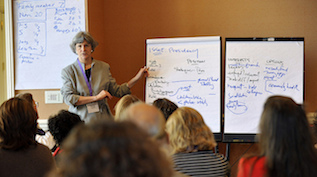Family Governance Meets Family Dynamics: Strategies for Successful Joint Philanthropy
Posted on October 28, 2007 by Fredda Herz Brown, Patricia Angus

This Passages issue paper explores the interplay of family dynamics and family governance in family philanthropies, concluding families who think about their governance systems, including how decisions will be made, are less likely to be encumbered by family dynamics than families who begin their philanthropies informally, progressing to formality over time. In addition, families who openly address their underlying internal… Read More










